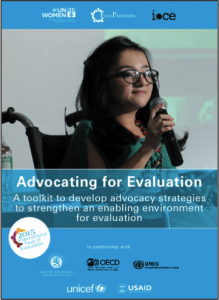My name is Neha Karkara, and I’m an independent consultant working with UN agencies. I specialize in developing and implementing human-rights based advocacy, knowledge management and communications strategies. Recently I worked with EvalPartners to develop a resource that will help civil society organizations (CSOs), Voluntary Organizations for Professional Evaluation (VOPEs), governments and other development partners to:
- Learn how strategic advocacy can be leveraged to increase the demand for evaluation.
- Acquire essential skills to become an effective advocate for building an enabling environment for evaluation.
- Devise a long-term advocacy strategy to develop and implement equity and gender sensitive national evaluation policies and systems.
- Respond quickly to seize any unplanned advocacy opportunity to build a culture of evaluation.
Lesson Learned: Evaluations are a means to support good governance and informed policy-making. Evaluations increase accountability from governments to their citizens and their development partners; bring in transparency in the use of resources and their results; and help in learning from experience. By helping to make better decisions based on facts, evaluations can lead to more effective and efficient use of public benefits.
 Rad Resource: The new publication “Advocating for Evaluation: A toolkit to develop advocacy strategies to strengthen an enabling environment for evaluation” has been jointly developed by EvalPartners, IOCE and UNWOMEN in partnership with UNEG, OECD Development Assistance Committee Network on Development Evaluation, UNICEF, Ministry for Foreign Affairs of Finland and USAID.
Rad Resource: The new publication “Advocating for Evaluation: A toolkit to develop advocacy strategies to strengthen an enabling environment for evaluation” has been jointly developed by EvalPartners, IOCE and UNWOMEN in partnership with UNEG, OECD Development Assistance Committee Network on Development Evaluation, UNICEF, Ministry for Foreign Affairs of Finland and USAID.
The PDF is now available, for free download here. An e-version of the toolkit is also available for free download here.
While technical evaluation capacities (the so-called supply side) are paramount to produce high-quality evaluative evidence, an enabling environment for evaluation is necessary to ensure it is actually used for decision-making. The toolkit contains guidance and tools on how to plan, design, implement, monitor and evaluate advocacy strategies for national evaluation policies and systems that are equity-focused and gender-responsive. The toolkit is especially designed for stakeholders with varying levels of experience, capacities and skills in strategic advocacy.
Hot Tip: Increased capacity for strategic advocacy for evaluation is specifically relevant given the presence of key opportunities, such as 2015 International Year of Evaluation (EvalYear). EvalYear presents a unique opportunity to advocate for and to promote evaluation and evidence-based policy-making at international, regional, national and local levels. Use this toolkit to develop an advocacy strategy for evaluation in your own organization and country, and share it with your key partners.
For more information, please contact:
- EvalPartners Co-Chairs, Marco Segone (marco.segone@unwomen.org) and Natalia Kosheleva (nkochele@yandex.ru)
- Advocacy Specialist, Neha Karkara (karkaraneha@gmail.com)
- EvalYear Secretariat, Asela Kalugampitiya (aselakalugampitiya@yahoo.ie)
Do you have questions, concerns, kudos, or content to extend this aea365 contribution? Please add them in the comments section for this post on the aea365 webpage so that we may enrich our community of practice. Would you like to submit an aea365 Tip? Please send a note of interest to aea365@eval.org . aea365 is sponsored by the American Evaluation Association and provides a Tip-a-Day by and for evaluators.
